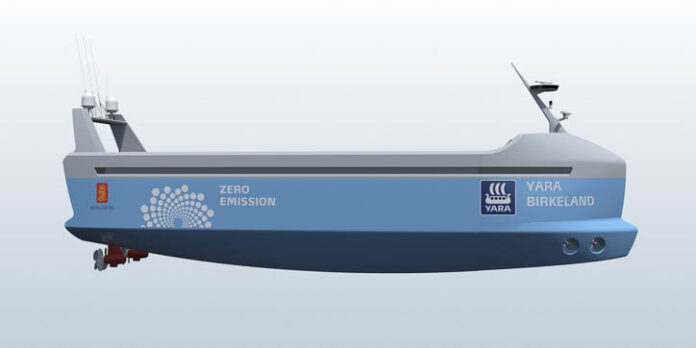YARA will reduce diesel-powered truck haulage by 40,000 journeys a year. KONGSBERG will integrate sensor, control, communication and electrical systems.
The vessel YARA BIRKELAND will be the world’s first fully electric and autonomous container ship, with zero emissions. Operation is planned to start in the latter half of 2018, shipping products from YARA’s Porsgrunn production plant to Brevik and Larvik in Norway.
Named YARA BIRKELAND after YARA’s founder, the famous scientist and innovator Kristian Birkeland, the vessel will be the world’s first fully electric container feeder. YARA’s new vessel will reduce NOx and CO2 emissions and improve road safety by removing up to 40,000 truck journeys in populated urban areas.
The vessel will be about 70 metres long, with a beam of 15 metres and a depth of 12 metres, the draught is expected to be about 5 metres. She will be propelled by electric motors driving two azimuth pods and two tunnel thrusters. Accumulators rated at 3.5–4.5 MWh will power the electric motors, giving her a service speed of 6 knots and a maximum speed of 10 knots. She will have a capacity of 100–150 TEU.
YARA BIRKELAND will initially operate as a manned vessel, moving to remote operation in 2019 and expected to be capable of performing fully autonomous operations from 2020. The new zero-emission vessel will be a game-changer for global maritime transport contributing to meet the UN sustainability goals.
World’s first autonomous, all-electric vessel for commercial operation
„As a leading global fertilizer company with a mission to feed the world and protect the planet, investing in this zero emission vessel to transport our crop nutrition solutions fits our strategy well. We are proud to work with KONGSBERG to realize the world’s first autonomous, all-electric vessel to enter commercial operation,“ says Svein Tore Holsether, President and CEO of YARA.
„Every day, more than 100 diesel truck journeys are needed to transport products from YARA’s Porsgrunn plant to ports in Brevik and Larvik where we ship products to customers around the world. With this new autonomous battery-driven container vessel we move transport from road to sea and thereby reduce noise and dust emissions, improve the safety of local roads, and reduce NOx and CO2 emissions,“ says Holsether.
A giant step forward for seaborne transportation
KONGSBERG is responsible for development and delivery of all key enabling technologies on YARA BIRKELAND including the sensors and integration required for remote and autonomous operations, in addition to the electric drive, battery and propulsion control systems.
„By moving container transport from land to sea, YARA Birkeland is the start of a major contribution to fulfilling national and international environmental impact goals. The new concept is also a giant step forward towards increased seaborne transportation in general,“ says Geir Håøy, President and CEO of KONGSBERG.
As a leading global maritime technology company, KONGSBERG’s integrated control and monitoring systems are already capable of providing technology for remote and unmanned operations. YARA BIRKELAND will benefit from competence and technologies developed across KONGSBERG.
„Developing systems for autonomous operations is a major opening and natural step for KONGSBERG, considering our decades of expertise in the development and integration of advanced sensors, control and communication systems for all areas of ship operations. YARA BIRKELAND will set the benchmark for the application of innovative maritime technology for more efficient and environmentally friendly shipping,“ says Håøy.




